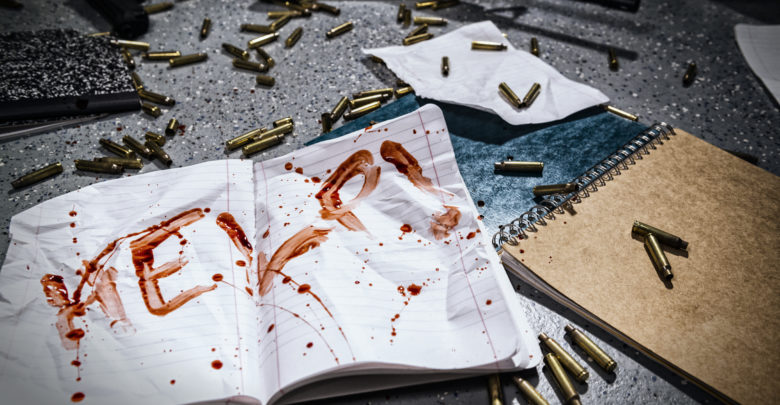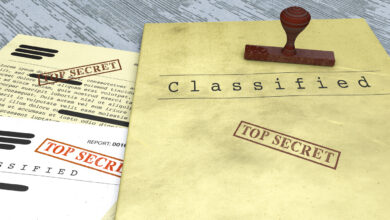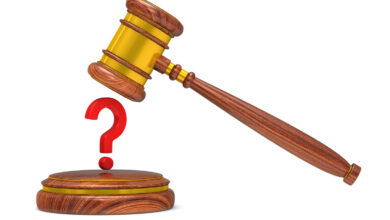Mass Shootings Are Not a “Mental Health Problem”

In the aftermath of the mass shootings in El Paso and Dayton that killed dozens of people, Donald Trump repeatedly blamed such events on mental health. “Mental illness and hatred pull the trigger, not the gun,” he said. And in another appearance, “We don’t want to see crazy people owning guns.”
By parroting this tired NRA talking point, Trump attempts to brush away any discussion – including his own words, uttered just days earlier – about addressing the never-ending epidemic of mass shootings that has plagued our country for decades.
“Treating mass shootings as primarily a mental health problem is a path to nowhere”
While there may be serious issues about the connection between mass shootings and mental illness, treating gun violence as primarily a mental health problem is a path to nowhere. It defines a malady that can never be cured.
Yes, with the aid of hindsight, it is easy enough to assign deviant behavioral pathology to each of the long list of mass shooters. Some are racists and anti-Semites. Some are angry obsessives. Some are super-partisan political fanatics. Some are alienated loners looking for a cause. Some are just lost, deluded souls.
In El Paso, a 21-year-old white male published an anti-immigrant, racist “manifesto” as a prelude to slaughtering 22 mostly Hispanic people with an AK-47 clone. The gunman’s screed called for division of the United States into territories by race. The shooter admitted to the police that he had targeted Mexicans.
Last year, a former Marine machine-gunner armed with a semi-automatic pistol and seven high-capacity magazines mowed down more than a dozen college students in a crowded bar in Thousand Oaks, before killing himself. The shooter had been known to be a “ticking time bomb” with serious anger-management problems, likely suffering from post-traumatic stress disorder.
Just weeks before the Thousand Oaks shooting, a raging anti-Semite, armed with a semi-automatic rifle and three semi-automatic pistols, had killed 11 people in a synagogue in Pittsburgh in the deluded belief that the Hebrew Immigrant Aid Society was bringing in “invaders” to “kill our people.”
Everybody (well, almost everybody) believes that it would be good to find a way to keep guns out of the hands of dangerous people like the El Paso, Thousand Oaks, and Pittsburgh shooters.
Easier said than done.
There is no way to enact legislation that will effectively keep deadly weapons out of the hands of dangerously unstable individuals without restricting the rights of millions of other mentally ill persons who pose no serious risk to society.
The current law doesn’t even come close. The Brady Bill requires federally licensed gun dealers to conduct background checks to screen out individuals who have been “adjudicated as a mental defective or committed to a mental institution.” Even if perfectly implemented, this narrow screen would not have prevented a single one of the mass shooters from legally obtaining guns.
“Extending background checks to gun shows would make it more difficult for criminals to acquire deadly weapons, but it would do almost nothing to screen out dangerously unstable people”
Extending background checks to gun shows and private sales nationwide makes all the sense in the world. It would undoubtedly make it more difficult for criminals to acquire deadly weapons. But it would do almost nothing to screen out dangerously unstable people who have no criminal record. The number of people who have been “adjudicated as a mental defective” is infinitesimal compared with the population of people suffering some form of mental illness, and a society that is concerned with individual freedom rightly makes it extraordinarily difficult to involuntarily commit anybody to a mental institution.
In order to be at all effective, the law would have to restrict sales to a much broader group of people than those who have been adjudicated as a “mental defective” or committed to a mental institution. It would somehow have to reach people like the El Paso, Thousand Oaks, and Pittsburgh shooters, none of whom had ever been adjudicated as a “mental defective” (whatever that loathsome term is supposed to mean) or committed to a mental institution.
Good luck with that.
Try drafting a law that effectively keeps guns out of the hands of those individuals and others like them without restricting the rights of millions of other people who pose no risk to society.
How, exactly, are the “dangerous” people going to be defined? Who is going to decide which of the 45 million adult Americans who suffer from some mental illness are so dangerous that their rights should be restricted? What kind of due process will be applied to the decision? How do you tell a lethally dangerous anti-Semite from a merely stupid bigot? Are you going to subject all Iraq and Afghanistan veterans to a mandatory screening process to determine which of them might snap? Who’s going to make that decision, based on what criteria? Don’t the mentally ill have rights, too?
Any attempt to broadly restrict the rights of the mentally ill would meet justifiable, immovable resistance not only from public health advocates, but from all quarters, including the National Rifle Association.
In perhaps its only sensible policy position, the NRA declares that “a person cannot be federally disqualified from owning a gun based simply on a psychiatrist’s diagnosis, a doctor’s referral, or the opinion of a law enforcement officer, let alone based on getting a drug prescription or seeking mental health treatment. Doing so would actually discourage troubled people from getting the help they need.”
True that.
If it isn’t possible to draft a workable, constitutional law that would narrowly target and disqualify only truly dangerous people, what’s the answer?
“We can’t ‘cure’ our way out of gun violence”
Never short on answers, the NRA offers a cheery, if ludicrous, solution to what it calls “the problem of mental illness and violence.”
Let’s cure our way out of it! Let’s “seek means by which society can identify, treat and temporarily isolate such individuals!”
Well all righty! Let’s wave our magic wand and cure all the mentally ill people! And until they’re all cured, all we need to do is “identify” and “isolate” them!
Really, doesn’t the NRA at least have somebody who looks at their statements to “identify” and “isolate” those that are too stupid to utter in public?
What, then, is the answer?
This isn’t rocket science. There are only two moving parts: (1) the guns, and (2) the people who use them.
There’s precious little that can be done on the people side of the equation. There’s just no effective, legal way to identify and disqualify all of the people who have the potential to become mass killers without running afoul of due process and deeply held American values.
But if our country really is awash with racists, anti-Semites, angry obsessives, hyper-partisan fanboys, alienated loners and deluded souls, wouldn’t the last thing we should do be to divide them into warring camps with hate speech, and then flood them with easily accessible weapons capable of slaughtering massive numbers of innocent people in mere seconds?
That brings us to the gun side of the equation.
We can do something about that, but it is a complicated task, fraught with constitutional red lines and clashing values.
Like it or not, the Supreme Court’s 2008 ruling in District of Columbia v. Heller that the Second Amendment protects an individual’s right to possess a firearm is the law of the land. Given the current composition of the court, that’s not going to change any time in the foreseeable future.
But that doesn’t end the discussion. Even Justice Scalia, the author of the court’s opinion in Heller, recognized that the right secured by the Second Amendment is not an unlimited right “to keep and carry any weapon whatsoever in any manner whatsoever and for whatever purpose.”
Justice Scalia made it clear that nothing in the Heller decision should cast doubt on laws forbidding the carrying of firearms in sensitive places, imposing “conditions and qualifications” on the commercial sale of arms, or banning certain kinds of “dangerous and unusual weapons.”
That is where the battle must be fought, at least in the near term.
If we can’t keep all guns out of the hands of dangerous people, maybe we can at least keep the most lethal assault weapons out of their hands by making it illegal for anybody to purchase them.. Maybe we can raise the minimum age to buy guns. Maybe we can ban bump stocks and other attachments that make it easy to convert a semi-automatic weapon into an automatic weapon. Maybe we can do much more.
Because even if we can’t stop potentially dangerous people from buying guns altogether, we can stop enabling them. We can limit the carnage they can wreak at any given time or place by eliminating the private sale of weapons designed for one purpose only, human slaughter.
“Until we start treating gun violence as a gun problem, the carnage will continue unabated”
In order to get there, though, first we have to put the lie to the NRA’s core talking point, now fully adopted by the president of the United States, that mass shootings are “a mental illness problem, not a gun problem.”
No. Every nation in the world has people with mental health problems, but no other civilized country is as awash in guns as we are. No other nation has a gun violence problem even approaching the magnitude of ours.
American gun violence is a gun problem, not a mental illness problem. Until we start treating it as such, the carnage will continue unabated.




